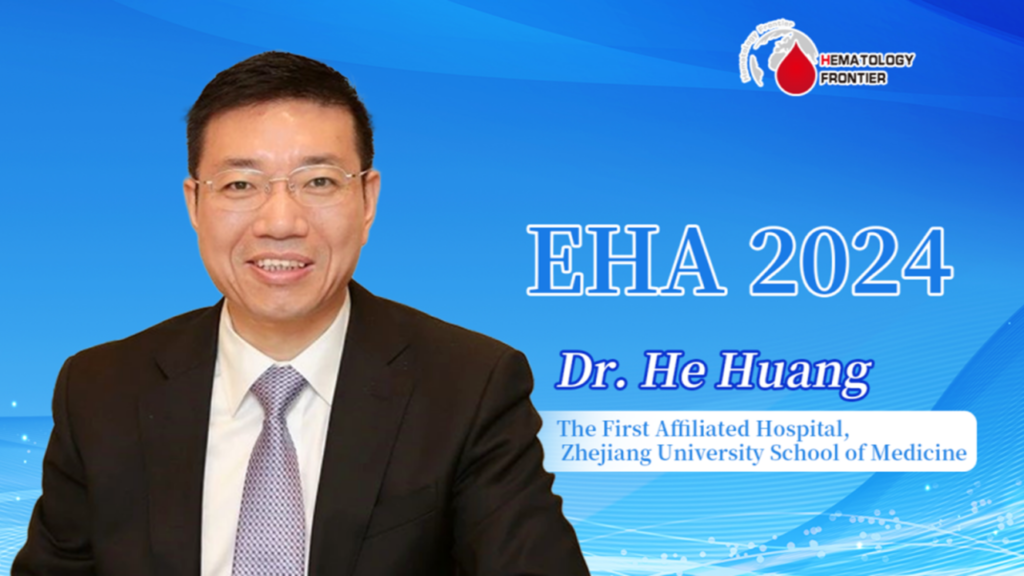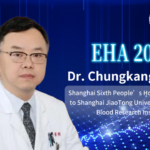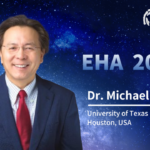
The 29th European Hematology Association (EHA) Annual Meeting was successfully held in Madrid, Spain, from June 13 to 16, 2024. As the largest international conference in the field of hematology in Europe, it annually attracts experts and scholars from around the world to share and discuss innovative ideas and the latest scientific and clinical research results in hematology. At this year's conference, several studies from Dr. He Huang's team at The First Affiliated Hospital, Zhejiang University School of Medicine were selected for poster presentations. These studies, covering both basic and clinical research, provide new perspectives and theoretical foundations for the treatment of hematological diseases. This article introduces five of these studies, including the impact of telomere length on transplant prognosis, the role of lactate in acute graft-versus-host disease, the regulatory mechanisms of hematopoietic endothelial cell (HECs) generation, breakthroughs in CD7 CAR-T therapy for T-cell malignancies, and the prospects of XPO1 inhibitors in the treatment of Burkitt lymphoma.1. Abstract Number: P1329
PATIENT TELOMERE LENGTH AND PROGNOSTIC INSIGHTS IN ALLO-HSCT FOR MALIGNANT HEMATOLOGIC DISEASES
First Author: Hengwei Wu; Corresponding Authors: He Huang, Yanmin Zhao
This study explored the correlation between telomere length (TL) before allogeneic hematopoietic stem cell transplantation (allo-HSCT) and patient survival. The cohort study included 397 patients with malignant hematologic diseases, analyzing blood samples taken before transplantation from 2016 to 2022. The findings revealed that shorter TL was associated with higher risks of death, relapse, and non-relapse mortality in patients with lymphoid malignancies, negatively impacting overall survival (OS) and disease-free survival (DFS). However, no significant impact of TL on survival was observed in myeloid malignancies. The results suggest that short TL may have potential prognostic implications in lymphoid malignancies, whereas patients with long TL are usually at lower risk and in complete remission before transplantation.
2. Abstract Number: P1295
LACTATE INDUCES TH1 RESPONSE IN ACUTE GRAFT-VERSUS-HOST DISEASE
First Author: Hengwei Wu; Corresponding Authors: He Huang, Yanmin Zhao
This study investigated the inflammatory response of Th1 cells in acute graft-versus-host disease (aGVHD) and the potential of reducing disease severity by inhibiting lactate production in T lymphocytes. The research team used gene editing technology to achieve T-cell-specific deletion of the Ldha gene in a mouse model, thereby reducing intracellular lactate levels in T-cells. The results showed that this modification led to downregulation of T-bet and IFN-γ expression, weakening the Th1 inflammatory response under in vitro polarization conditions. In the established aGVHD model, mice with Ldha-/- T-cells exhibited milder aGVHD symptoms, such as reduced hair loss, minimal weight loss, minor changes in spleen size, lower aGVHD scores, and significantly improved survival rates. RNA-seq analysis and qPCR validation further confirmed the overall downregulation of Th1 inflammation-related genes. These findings suggest that reducing lactate production in T-cells is a potential therapeutic strategy to mitigate Th1 inflammatory responses and alleviate aGVHD, offering new ideas for clinical treatment.
3. Abstract Number: P1385
ELTD1 NEGATIVELY REGULATES DIFFERENTIATION OF HEMOGENIC ENDOTHELIAL CELLS FROM HUMAN EMBRYONIC STEM CELLS THROUGH WNT/HPIP PATHWAY
First Author: Qian Luo; Corresponding Author: He Huang
Pluripotent stem cells (PSCs) have great clinical application potential, but their efficiency in differentiating into hematopoietic stem cells is currently low, mainly due to limited understanding of the hematopoietic regulatory signaling network. This study aimed to explore the mechanism of PSC differentiation into hematopoietic stem cells, particularly through the generation of hematopoietic endothelial cells (HECs) during endothelial-hematopoietic transition (EHT). The study identified ELTD1 as a new regulatory factor of HECs and a key player in the hematopoietic differentiation of hESCs. Using iCRISPR/Cas9 technology to knock out the ELTD1 gene, the research found that the absence of ELTD1 significantly affected the generation of HECs, subsequently impacting the formation of hematopoietic cells. RNA-Seq analysis showed that ELTD1 regulates HEC generation through the Wnt signaling pathway, with Wnt target genes such as TCF7L1, CCND1, BIRC5, and AXIN2 being downregulated in ELTD1-deficient cells. Further molecular mechanism studies revealed that ELTD1 interacts with HPIP to regulate the Wnt signaling pathway, where HPIP is a critical factor for ELTD1-mediated Wnt target gene expression. These findings provide new perspectives on understanding human hematopoiesis and potential new strategies for obtaining hematopoietic stem cells in vitro.
4. Abstract Number: P1471
PHASE I STUDY OF AN ANTI-CD7 UNIVERSAL CAR-T THERAPY FOR PATIENTS WITH RELAPSED/REFRACTORY CD7 POSITIVE T-ALL/LBL
First Author: Yongxian Hu; Corresponding Author: He Huang
T-cell acute lymphoblastic leukemia (T-ALL) and T-cell lymphoblastic lymphoma (T-LBL) are aggressive malignancies with limited effective treatment options. CD7, as a potential target, enables CAR-T cell therapy for these diseases. The research team developed an innovative “off-the-shelf” CAR-T product RD13-02, modified using CRISPR/Cas9 technology to disrupt T-cell receptor (TCR) and CD7, preventing T-cell fratricide. A phase I clinical trial evaluated the safety and efficacy of RD13-02 in patients with relapsed/refractory (R/R) T-ALL/LBL. The study included 12 patients divided into four dose groups, receiving RD13-02 infusion after lymphodepleting therapy. Results showed no dose-limiting toxicity, neurotoxicity, or graft-versus-host disease across all dose levels, and cytokine release syndrome (CRS) was manageable. Preliminary efficacy evaluation indicated that 92% of patients achieved complete remission or complete remission with incomplete hematologic recovery. The study concluded that RD13-02 is safe and effective for CD7+ R/R T-ALL/LBL patients, but further larger samples and long-term follow-up are needed to verify its efficacy.
5. Abstract Number: P1264
XPO1 INHIBITOR TRIGGERS AUTOPHAGY OF TP53-MUTATED BURKITT LYMPHOMA CELLS
First Author: Mowang Wang; Corresponding Author: He Huang
Burkitt lymphoma is a highly aggressive B-cell non-Hodgkin lymphoma, where intensive chemotherapy has improved patient survival, but TP53 mutations are associated with high relapse rates. The XPO1 inhibitor KPT330, a novel targeted drug, has shown potential in treating other cancers. This study aimed to investigate the efficacy and mechanism of KPT330 in Burkitt lymphoma. Using 4D LFQ quantitative proteomics analysis, the study found that KPT330 treatment increased the nucleocytoplasmic ratio of proteins mainly involved in autophagy regulation and the p53 signaling pathway in Burkitt lymphoma cell lines. The results indicated that KPT330 could trigger autophagy, increasing the expression of autophagy-related proteins LC3B-I and LC3B-II without affecting their degradation. The constructed LC3B stable overexpression cell line further confirmed KPT330’s promotion of autophagy. Additionally, KPT330 treatment increased the nucleocytoplasmic ratio of TFEB protein, upregulating the expression of genes related to autophagosome formation and lysosome biogenesis. USP10 expression significantly increased in the nucleus after KPT330 treatment, maintaining p53 stability by reducing its ubiquitination level. In vivo animal model experiments showed that KPT330 monotherapy had a certain tumor-suppressing effect. In summary, the XPO1 inhibitor KPT330 regulates autophagy and stabilizes p53 function in TP53-mutated Burkitt lymphoma cells by limiting the nuclear export of autophagy-related proteins, providing a promising new treatment approach for Burkitt lymphoma.
Dr. He Huang
- Qiushi Distinguished Professor at Zhejiang University, Zhejiang Province Top Expert, Chief Scientist of 973 Program, Chief Physician, Doctoral Supervisor
- Director of the Hematology and Bone Marrow Transplantation Center at the First Affiliated Hospital of Zhejiang University School of Medicine
- Director of Zhejiang University Institute of Hematology, Director of Zhejiang Provincial Engineering Center for Stem Cell and Cell Immunotherapy
- Member of the Expert Group for the National Key Research and Development Program “Stem Cells and Translational Research”
- Deputy Director of the Expert Committee of the Chinese Bone Marrow Donor Program
- Standing Member of the Hematology Branch of the Chinese Medical Association
- Vice Chairman of the Academic Committee of the Asian Cell Therapy Organization
- Executive Committee Member of the Asia-Pacific Blood and Marrow Transplantation Group
- International Academic Committee Member of the European Society for Blood and Marrow Transplantation
- President of the Zhejiang Immunological Society
- Chairman of the Hematologic Oncology Committee of the Zhejiang Anti-Cancer Association
- Winner of the National Science and Technology Progress Award (second prize) in 2003 and 2015
- Principal Investigator of 27 projects including the 973 Program, 863 Program, National Natural Science Foundation Key Projects, and National Natural Science Foundation International Cooperation and Exchange Projects
- Corresponding author of 278 SCI papers published in journals such as New England Journal of Medicine, Nature, Cell Research, and Lancet Haematology
- Recipient of 15 provincial and ministerial-level science and technology awards
- Holder of 21 authorized invention patents
- Served as chair, invited speaker, and oral presenter at over 100 international conferences in the past five years
- Chaired the Asia-Pacific International Bone Marrow and Hematopoietic Stem Cell Transplantation Conference in 2005 and 2014 in Hangzhou
- Editor-in-chief of the first domestic monograph on CAR-T cell therapy CAR-T Cell Immunotherapy published by the People’s Medical Publishing House
- Editor-in-chief of the national postgraduate textbook Hematology published by the People’s Medical Publishing House, and co-authored 11 other books and textbooks
- Editorial board member of authoritative international journals in the field of hematopoietic stem cell transplantation such as Bone Marrow Transplantation and Journal of Hematology and Oncology


